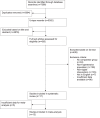A systematic review and meta-analysis of digital interventions targeting lifestyle factors in patients with hypertension
- PMID: 40764400
- PMCID: PMC12500467
- DOI: 10.1038/s41371-025-01051-3
A systematic review and meta-analysis of digital interventions targeting lifestyle factors in patients with hypertension
Abstract
Hypertension is a major risk factor for cardiovascular disease, for which the management involves both lifestyle modification (diet, exercise etc) and medication. Digital interventions (mobile applications, websites, and SMS messages) are being developed to facilitate lifestyle change, but their effectiveness remains uncertain. This review aimed to establish whether digital interventions targeting lifestyle factors are effective in reducing blood pressure in individuals with hypertension. A systematic search was run through MEDLINE, EMBASE and the Cochrane Library. 5302 records were screened for eligibility and data on the primary outcome (systolic blood pressure (SBP)) and secondary outcomes (diastolic blood pressure (DBP) and change in lifestyle factors) were extracted from eligible papers. Where sufficient data were available, meta-analysis was undertaken using a random effects model. 17 randomised controlled trials were eligible for inclusion (3040 patients). 12 studies were suitable for meta-analysis. Lifestyle change mediated by digital interventions were associated with a larger SBP reduction than controls (mean difference (MD) -2.91 mmHg; 95% confidence interval (CI) -4.11, -1.71; p value (p) <0.0001). A significant difference was also seen in DBP reduction between groups (MD -1.13 mmHg; CI -1.91, -0.35; p = 0.005). Reporting of other secondary outcomes relating to lifestyle change was too heterogenous for meta-analysis. Digital interventions targeting lifestyle factors were associated with an improvement in blood pressure in patients with hypertension, but interpretation of the results is limited by significant heterogeneity between studies. Further research is required to understand which lifestyle factors, when targeted with digital interventions, result in maximal blood pressure reduction.
© 2025. The Author(s).
Conflict of interest statement
Competing interests: RM has worked with Sensyne and Omron to develop digital interventions for hypertension for which his institution has received consultancy and licencing payments. TK is a contributor to intellectual property licensed by Oxford University Innovation to AstraZeneca. All other authors declare no conflicts of interest. Ethical approval: Ethical approval was not sought for this study as the systematic review and metaanalysis used only publicly available documents.
Figures




References
-
- Forouzanfar MH, Afshin A, Alexander LT, Anderson HR, Bhutta ZA, Biryukov S, et al. Global, regional, and national comparative risk assessment of 79 behavioural, environmental and occupational, and metabolic risks or clusters of risks, 1990–2015: a systematic analysis for the Global Burden of Disease Study 2015. Lancet. 2016;388:1659–724. - PMC - PubMed
-
- Lim SS, Vos T, Flaxman AD, Danaei G, Shibuya K, Adair-Rohani H, et al. A comparative risk assessment of burden of disease and injury attributable to 67 risk factors and risk factor clusters in 21 regions, 1990–2010: a systematic analysis for the Global Burden of Disease Study 2010. Lancet. 2012;380:2224–60. - PMC - PubMed
-
- NICE guideline NG136. Hypertension in adults: diagnosis and management. National Institute for Health and Care Excellence; 2019. https://www.nice.org.uk/guidance/ng136. - PubMed
-
- Lewington S, Clarke R, Qizilbash N. Age-specific relevance of usual blood pressure to vascular mortality: a meta-analysis of individual data for one million adults in 61 prospective studies. Lancet. 2002;360:1903–13. - PubMed
-
- Collins R, Peto R, MacMahon S, Godwin J, Qizilbash N, Collins R, et al. Blood pressure, stroke, and coronary heart disease. Lancet. 1990;335:827–38. - PubMed
Publication types
MeSH terms
LinkOut - more resources
Full Text Sources
Medical

